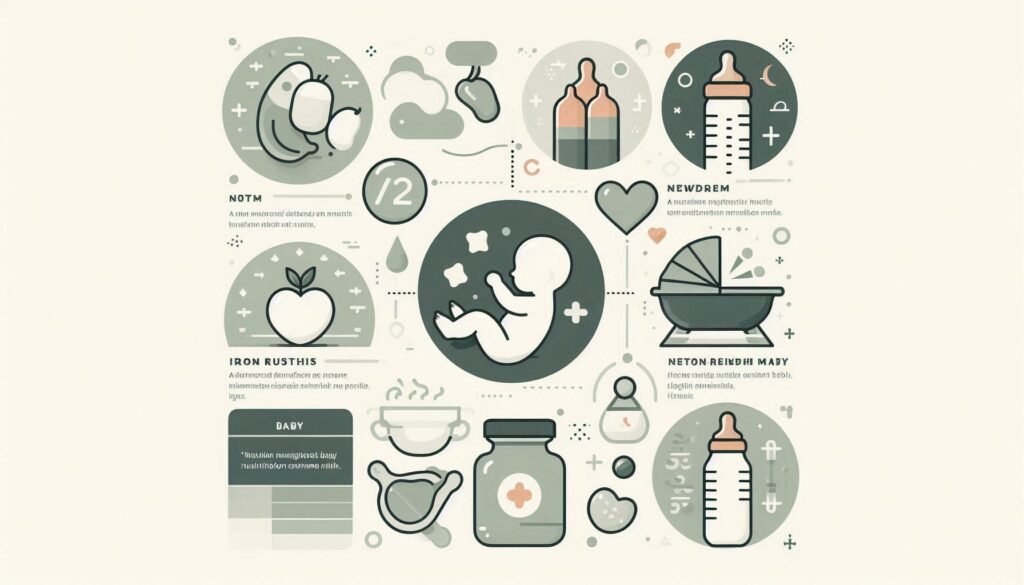Introduction
The arrival of a newborn is an exciting time for any family, but it also comes with the crucial responsibility of ensuring their healthy growth and development. Nutrition plays a pivotal role in the early stages of a baby’s life, laying the foundation for their future health. If you’re a new parent or caregiver seeking guidance on how to provide the best nutritional start for your little one, you’re in the right place. This comprehensive guide will explore essential nutrition tips for newborns, offering valuable insights and practical advice to help your baby thrive.
Why Nutrition Matters for Newborns
Proper nutrition is vital for newborns as their bodies and brains are rapidly developing. The right balance of nutrients supports brain development, immune function, and overall physical growth. During the first year of life, babies undergo significant milestones, including doubling their birth weight and reaching new developmental stages. Optimal nutrition during this period is crucial for ensuring that they meet these milestones and develop a strong, healthy foundation.
Essential Nutrients for Newborns

1. Breast Milk or Formula: The Cornerstone of Nutrition
For the first six months of life, breast milk or formula should be the primary source of nutrition. Breast milk provides the perfect balance of proteins, fats, vitamins, and minerals tailored to a newborn’s needs. It also contains antibodies that boost the baby’s immune system. If breastfeeding is not an option, infant formula is a nutritious alternative that closely mimics breast milk’s composition.
- Breastfeeding Benefits: Provides essential antibodies, promotes bonding, and reduces the risk of certain infections.
- Formula Feeding: Offers a balanced nutrient profile and can be easier for some families to manage.
2. Iron: A Vital Mineral for Growth
Iron is crucial for the development of healthy red blood cells and cognitive function. Newborns are born with iron stores, but these deplete quickly. Ensuring an adequate iron intake is essential for preventing anemia and supporting optimal brain development.
- Iron-Rich Foods: For babies older than six months, iron-fortified cereals and pureed meats can be introduced to boost iron levels.
3. Vitamin D: Strengthening Bones and Immune System
Vitamin D plays a crucial role in calcium absorption and bone health. While breast milk contains some vitamin D, it may not be sufficient, especially in areas with limited sunlight. Pediatricians often recommend vitamin D supplements to ensure babies receive adequate amounts.
- Supplementation: Consult with your pediatrician to determine the appropriate dosage.
4. Omega-3 Fatty Acids: Supporting Brain Development
Omega-3 fatty acids are essential for brain and eye development. They can be found in breast milk, but supplementation might be necessary if breastfeeding is not possible.
- Sources: For breastfeeding mothers, consuming omega-3-rich foods like fish can enhance the nutrient profile of breast milk.

5. Hydration: Keeping Your Baby Well-Hydrated
Hydration is critical for newborns, but their fluid needs are typically met through breast milk or formula. It’s essential to monitor for signs of dehydration, such as reduced wet diapers or a dry mouth.
Introducing Solid Foods: A New Chapter
Around six months of age, babies are ready to explore solid foods. This transition should be gradual and involve introducing single-ingredient purees to identify any potential food allergies.
- Start with Iron-Rich Foods: Pureed meats, legumes, and iron-fortified cereals are great choices.
- Incorporate Fruits and Vegetables: Offer a variety of colors and textures to ensure a balanced intake of vitamins and minerals.
Creating a Balanced Diet: What to Avoid
As you introduce solids, it’s important to avoid certain foods that can pose risks or offer little nutritional value:

- Honey: Avoid giving honey to babies under one year due to the risk of botulism.
- Choking Hazards: Foods like whole nuts, popcorn, and grapes should be avoided to prevent choking.
Monitoring Growth and Development
Regular check-ups with your pediatrician will help track your baby’s growth and development. Your healthcare provider can offer personalized advice based on your baby’s specific needs and any nutritional adjustments that might be required.
Conclusion
Providing your newborn with the right nutrition is one of the most important things you can do to support their healthy growth and development. By focusing on breast milk or formula, ensuring adequate iron and vitamin D intake, incorporating omega-3 fatty acids, and gradually introducing solid foods, you’re setting your baby up for a strong start in life. Remember, every baby is unique, so it’s essential to work closely with your pediatrician to tailor their nutritional needs.


